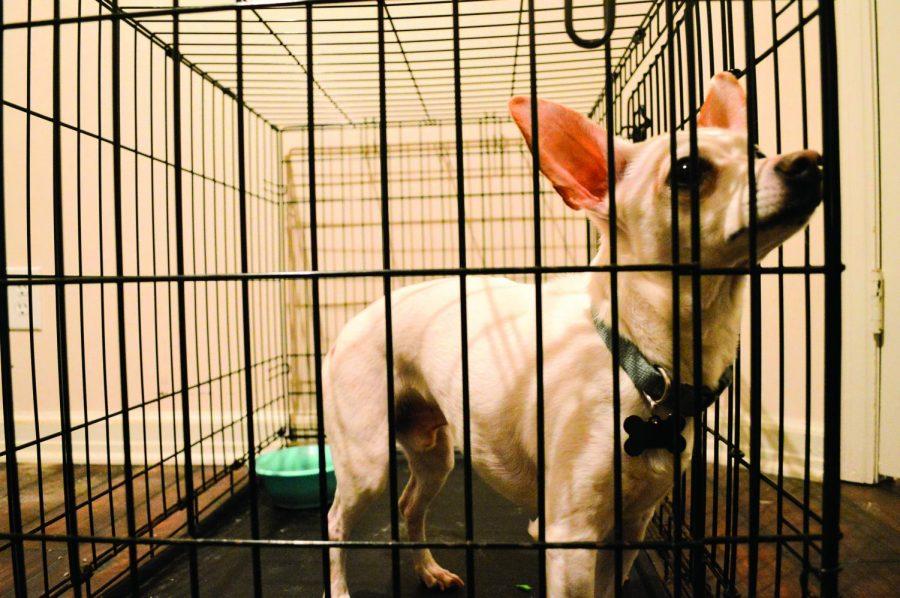Pets can create additional responsibilities, costs for students
February 27, 2014
There are many perks to living off campus as a student — the greater of these include privacy, personal bathrooms, better food options and, for some students, the option to have pets to keep them company.
Many students who live off campus choose to adopt pets to give them the companionship they lose when they give up dorm life after their first years of college.
“A lot of college students adopt from (The Florence-Lauderdale Animal Shelter). It gives many animals a chance at a better life and a loving home,” said Vinny Glasso, animal control supervisor of the Florence-Lauderdale Animal Shelter.
A major factor in determining if owning a pet is possible for a student is whether or not a pet is allowed where the student lives.
Besides fish in small tanks, University Housing does not allow any kind of pets in either the dorms or in University Apartments. Many apartment complexes in Florence have similar regulations. Few in town, however, allow pets with a deposit, sometimes with regulations of type and weight of the pet.
The Woodlands apartment complex on Bradshaw Drive in Florence, according to their website, only allows dogs weighing less than 25 pounds as pets. A pet deposit of $500 is required upon moving in.
Dogs require a lot of hands-on training and social time, said student Brandi Gooch, who owns a pitbull mix named Rosie.
The amount of playtime and attention a dog needs depends on the personality of the dog, she said.
“All my free time goes to her, and when I’m not home she is asleep,” she said.
Gooch is not the only dog owner at UNA who understands the amount of time and attention dogs need. Desiree Smith Raper, a graduate student, believes she is able to devote an adequate amount of time to her two dogs, Banjo and Bandit.
“When I was getting an undergraduate degree, I don’t think I would have had enough time (to care for my dogs) because of band and other activities in which I was involved,” Raper said.
Some students like student Mac Pylant choose to adopt animals that require less time and attention. Pylant has adopted an African Pygmy hedgehog through a contact made by a hedgehog breeder. He said his hedgehog Albus and most other hedgehogs naturally like a lot of “me time” in addition to their handling.
“I will get him out on average at least three times a day, whether just to love on him or bathe him or just to cuddle with him,” Pylant said.
After evaluating all of the pros and cons of owning a pet, there are many resources in Florence to find the perfect pet. The Florence-Lauderdale Animal Shelter, which houses many adoptable dogs and cats, frequently adopts animals out to college students. For $75, students can choose a furry friend that is up to date on their shots and comes with a voucher for a spay/neuter procedure, if it is not already fixed.
Glasso said the best part of students adopting pets is that an animal gets a chance at a loving home. Adopting pets helps the Florence shelter keep their status of “Low Kill/No Kill,” since it is the only public shelter in the state with this classification, he said.
If the Florence-Lauderdale Animal Shelter does not have a student’s ideal pet, there are dozens of adoptable dogs in foster care through Heart of Alabama Save, Rescue, Adopt, a non-profit organization in Florence that works to rescue dogs and place them in secure and loving homes.
HASRA president Debbie Rappuhn said they have many foster dogs to choose from. They found homes for 111 dogs in January alone.
Both Glasso and Rappuhn said the most frequent problem students have when adopting an animal is lack of preparation for the future.
“When you adopt a pet, it is for their entire life,” Rappuhn said.
For students who cannot afford the responsibility and cost of owning an animal, the Florence-Lauderdale Animal Shelter and HASRA always encourage temporary fosters and volunteers to assist in caring for the animals that come through their doors.












